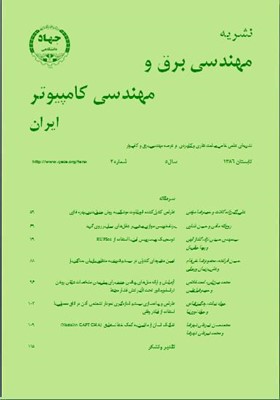طراحي کنترلکننده اتوپايلوت موشک به روش جدولبندي بهره فازي
محورهای موضوعی : electrical and computer engineeringعلي اکبرزاده کلات 1 * , حمیدرضا مؤمنی 2
1 - دانشگاه تربيت مدرس
2 - دانشگاه تربیت مدرس
کلید واژه: جدولبندي بهره فازياتوپايلوتضرايب آيروديناميکيالگوريتم ژنتيکحداقل مربعات خطي,
چکیده مقاله :
در اين مقاله يک کنترلکننده به روش جدولبندي بهره فازي براي کانالهاي هدايتي موشکهاي تاکتيکي طراحي گرديده است به نحوي که در کليه شرايط پروازي پاسخ مناسبي داشته باشد. ديدگاه اين طراحي تعيين مراکز نواحي جدولبندي بهره فازي با آموزش يک سيستم فازي بر اساس اطلاعات فشار ديناميکي و سرعت موشک و ضرايب مدل خطي سيستم در سراسر نقاط کاري آن ميباشد. آموزش سيستم فازي با استفاده از يک روش مبتني بر ترکيب حداقل مربعات خطي و الگوريتم ژنتيک انجام ميشود تا هم رسيدن به بهينه کلي ميسر شود و هم سرعت همگرايي خوبي حاصل شود. به علاوه در سيستم فازي استفادهشده، توابع عضويت با خصوصيات مناسبي به کار گرفته ميشوند تا طراحي سادهتر و مؤثرتر انجام گيرد. کارآيي اين روش با نتايج شبيهسازي نشان داده ميشود.
In this paper a controller using fuzzy gain-scheduling for the channels of a tactical missile is designed such that in flight trajectories, performance is achieved. In this design method, the fuzzy gain-scheduling zone centers are determined by a training algorithm according to dynamic pressure, Mach number and coefficients of linear model of system in major operating points. The fuzzy system is learned using combined genetic and linear least squares algorithms. In this manner both global optimum solution and fast convergence are reachable. Moreover the membership functions in fuzzy inference system are chosen with special and suitable properties, which cause simple and effective scheduling process. Performance of this method is shown with case study simulation result.
[1] Z. Zhao, M. Tomizuka, and S. Isaka, "Fuzzy gain scheduling of PID controllers," IEEE Trans. on Systems, Man and Cybernetics, vol. 23, no. 5, pp. 1392-1398, Sep./Oct. 1993.
[2] J. Chen, "An integration design approach in PID controller," in Proc. Int. Conf. on Intelligent Processing and Manufacturing of Materials, vol. 2, pp. 901-907, 1999.
[3] P. Viljamaa and H. N. Koivo, "Fuzzy logic in PID gain scheduling," in Proc. 3rd European Congress on Fuzzy and Intelligent Technologies, vol. 2, pp. 927-931, Aachen, Germany, Aug. 1995.
[4] H. Koivo, "Fuzzy gain scheduling of MIMO PID controllers for nonlinear multivariable systems," in Proc. IEEE Int. Conf. on Systems, Man and Cybernetics, vol. 1, pp. 320-325, Oct. 2002.
[5] S. Tzafestas and N. P. Papanikolopoulos, "Incremental fuzzy expert PID control," IEEE Trans. on Industrial Electronics, vol. 37, no. 5, pp. 365-371, Oct. 1990.
[6] T. Pattaradej, P. Jundang, G. Chen, and P. Sooraksa, "A speed evaluation for conventional PID and fuzzy controllers," in Proc. of the 2nd Int. Conf. on Intelligent Technologies, pp. 91-96, Bangkok, Thailand, Nov. 2001.
[7] P. G. Gonsalves and G. L. Zacharias, "Fuzzy logic gain scheduling for flight control," in Proc. of the 3rd IEEE Conf. on Fuzzy Systems, vol. 2, pp. 952-957, Jun. 1994.
[8] P. Bergsten, M. Persson, and B. Iliev, "Fuzzy gain scheduling for flight control," in Proc. 26th IEEE Conf. on Industrial Electronics Society, IECON 2000, vol. 1, pp. 271-276, 2000.
[9] M. Osterom and R. Babuska, "Fuzzy gain scheduling for flight control laws," in Proc. IEEE Int. Conf. on Fuzzy Systems, vol. 2, pp. 716-719, Dec. 2001.
[10] C. L. Lin, "On the design of an adaptive fuzzy gain-scheduled autopilot," in Proc. American Control Conf., vol. 2, pp. 1567-1572, 2002.
[11] K. Tanaka, T. Ikeda, and H. O. Wang, "Fuzzy regulators and fuzzy observers: relaxed stability conditions and LMI-based designs," IEEE Trans. on Fuzzy Systems, vol. 6, no. 2, pp. 250-265, May 1998.
[12] P. Myszkorowski and R. Longchamp, "On the stability of fuzzy control systems," in Proc. of the 32nd Conf. on Decision and Control, vol. 2, pp. 1751-1752, Dec. 1993.
[13] J. H. Chou and C. H. Hsieh, "Stability conditions of fuzzy gain scheduling systems," International J. of Fuzzy Systems, vol. 4, no. 3, pp. 843-848, 2002.
[14] K. Zhou and P. Khargonekar, "Stability robustness bounds for linear state-space models with structured uncertainty," IEEE Tran. on Automatic Control, vol. 32, no. 7, pp. 621-623, Jul. 1987.
[15] M. A. Leal and J. S. Gibson, "A first-order Lyapunov robustness method for linear systems with uncertain parameters," IEEE Trans. on Automatic Control, vol. 35, no. 9, pp. 1068-1070, Sep. 1990.
[16] K. Tanaka and H. O. Wang, "Fuzzy regulators and fuzzy observers: a linear matrix inequality approach," in Proc. of the 36th IEEE Conf. on Decision and Control, vol. 2, pp. 1315-1320, Dec. 1997.
[17] D. Driankov, R. Palm, and U. Rehfuess, "A takagi-sugeno fuzzy gain-scheduler," in Proc. 5th IEEE Int. Conf. on Fuzzy Systems, vol. 2, pp. 1053-1059, Sep. 1996.
[18] M. Alata and K. Demirli, "Fuzzy control and gain scheduling-case study: robust stabilization of an inverted pendulum," in Proc. IFSA World Congress and 20th NAFIPS Int. Conf., vol. 5, pp. 3015-3020, Jul. 2001.
[19] D. McGrane, "Determination of design regions for fuzzy gain-scheduled robust controllers," in Proc. IEEE Int. Conf. on Fuzzy Systems, vol. 1, pp. 384-389, May 1998.
[20] B. Wu and X. Yu, "Evolutionary design of fuzzy gain scheduling controllers," in Proc. Congress on Evolutionary Computation, vol. 3, pp. 2139-2144, 1999.
[21] R. Palm and C. Stutz, "Generation of control sequences for a fuzzy gain scheduler," International J. of Fuzzy Systems, vol. 5, no. 1, pp. 1-10, 2003.
[22] P. Zarchan, Tactical and Strategic Missile Guidance, 4th Edition, AIAA, pp. 468-474, 2002.
[23] L. X. Wang, A Course in Fuzzy Systems and Control, Prentice-Hall, International Inc., 1997.
[24] D. E. Goldberg, Genetic Algorithms in Search, Optimization, and Machine Learning, Addison-Wesley, 1989.

